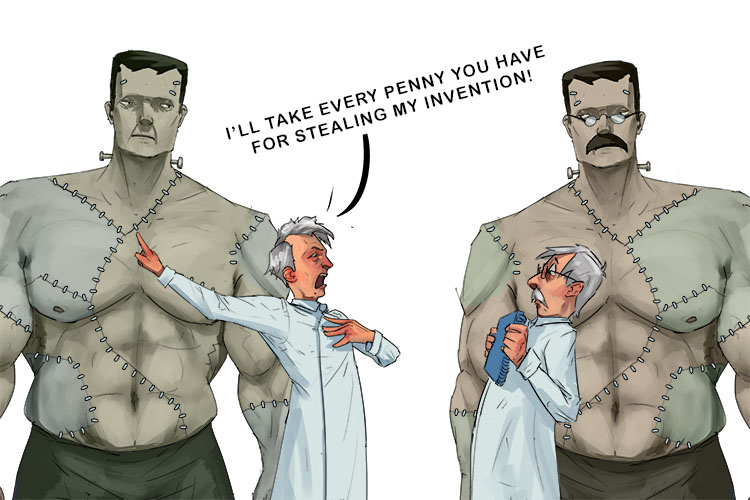Patent – A legal document giving the holder exclusive intellectual rights over a specific invention
(Pronounced pay-tnt)
Note: Intellectual refers to creations of the mind such as inventions, literary and artistic works, designs, symbols, names and property not physical in nature.
To remember what patent means use the following mnemonic:
You'll have to pay an exorbitant (patent) amount of money if you illegally use the exclusive intellectual property rights of someone's invention.

After designing a new invention or production process, you can apply to the patent authority in your respective region to have your design patented. If accepted, this design is now your intellectual property, and until the patent expires (usually 20 years approximately) it is yours to do with as you wish. You can either utilise the patent yourself to produce goods, sell the patent entirely or license the patent to someone else while gathering a percentage of royalties for future sales.
An example of a very successful patent is the Velcro hook and loop fastening system. Invented in 1958, the invention reached sales worth $177 million in 1996, and $298 million in 2008 on its 50th anniversary. This simple invention was patented after the designer noticed how the tiny hooks of cocklebur seeds hung onto clothes and animal fur.
Another wildly successful patent was the tri-cone rotary drill bit, which revolutionised the mining industry by drilling through hard rock at an exponentially faster rate than drill bits used before. The invention of the device and granting of the patent lined up with the Texas oil boom of the early 1900s, and led directly to the building of a business empire for the Hughes family.
Pharmaceutical companies make medical drugs in order to make a profit. A successful drug will then fund the next breakthrough treatment. From the date on which the application for the patent was filed a pharmaceutical company has 20 years to make money. A drug can take 10 to 15 years or more to complete all 3 phases of clinical trials before they have a license to sell a drug. If a pharmaceutical company has taken 18 years to get a drug to market, they only have 2 years to make money before other companies copy the product and bring it to the market immediately. Many pharmaceutical companies are saying they want an extended patent protection period, as some drugs take much longer to get to market. They say that due to this, it’s not worth developing these drugs and that the patent period should be extended otherwise there will be less innovation and fewer drugs.




